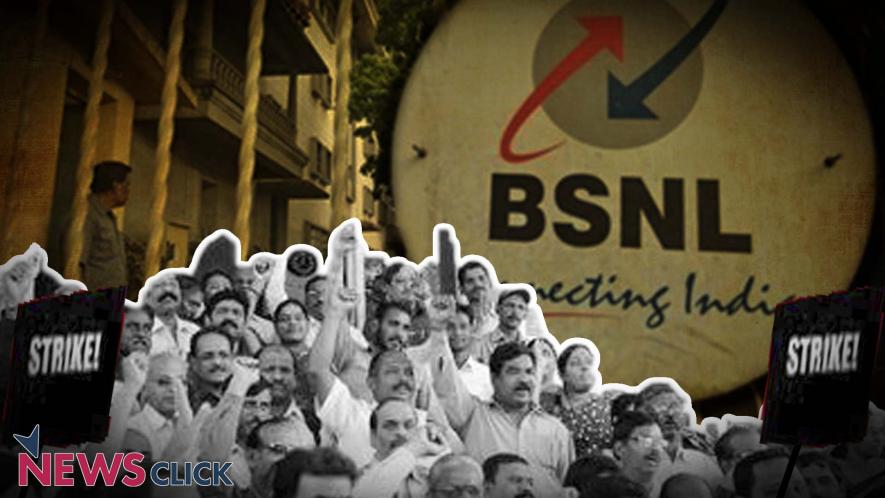BSNL Employees to Protest Against Centre’s Attempts to Disconnect the “Connecting India” Services

Newsclick Image by Sumit
Amidst the continuing bloodbath in the Indian Private Sector telecom industry, employees from the Bharat Sanchar Nigam Limited (BSNL) and its sibling Mahanagar Telephone Nigam Limited (MTNL) are all set to protest against the Centre’s moves which facilitate the privatisation of these Public sector services.
Demanding the rollback of the BJP-led central government’s decision to form a separate “independent” tower company, the unions and associations of BSNL will launch a hunger strike for five days from January 30 onwards, at the corporate office, circle and district levels. Following these, the employees will march to Sanchar Bhawan on February 28, 2018.
Other demands in the charter include the settlement of third Pay Revision with 15 percent fitment from January 1, 2017, and pension revision. It also seeks settlement of left-out issues of the second Pay Revision Committee (PRC). “Though some of the issues related to Performance Related Pay got addressed in the 3rd PRC, it is in line with the 7th pay revision of the Central Government employees and the fitment benefit has come down from 30 percent to 15 percent,” National Confederation of Officers’ Association said in a statement. The unions are also opposing the Centre’s move to reduce the retirement age from 60 to 58.
What is happening to BSNL and MTNL?
The Public sector telecom services, BSNL and MTNL, which protect the entire market from the authoritarian strategies of the private entities, were formed to provide a comprehensive range of services for the customers. Though BSNL had become one of the largest public sector units in India within the span of initial five years, a crisis has been revolving around this sector for last few years.
As part of the policies of the Centre, Niti Aayog had submitted a list of 74 sick and loss making Public Sector Undertakings to the government for shutting down and restructuring in July 2016. “BSNL and MTNL were in the list for strategic disinvestment,” said VAN Namboodiri, from the BSNL Employees Union, while speaking to Newsclick.
Following this, the union cabinet had approved hiving off the mobile tower assets of BSNL into a separate company on September 13, 2017. The cabinet had authorised BSNL to "monetise its telecom tower infrastructure with the formation of a separate subsidiary", but the Employees Unions and Associations have termed it as a move to privatise the sector.
“Though the government was saying that the tower company would be a 100 percent subsidiary of BSNL, the government had appointed a chairman and CMD for the company without receiving the approval of BSNL board. They had registered the tower company as per the company act without informing BSNL board,” said K Sebastian, representative of Sanchar Nigam Employees Association (SNEA), while speaking to Newsclick.
Out of the total 4.4 lakh telecom towers in the country, BSNL owns 66000 towers. 75 percent of the towers were constructed after the formation of BSNL and the rest were initially with Department of Telecommunications and later they were handed over to BSNL. “During the last year, BSNL has earned 250 crores by sharing towers, one of the revenues earning process of the BSNL, and the revenue from tower sharing is increasing by 20 to 30 percent per year”, said Sebastian.
“Our apprehension is that the Government will privatise the subsidiary company, which allows external tenancies or disinvest. That means the business potential which we have, would be taken out of the control of BSNL,” Sebastian added.
“Thought the government says that the BSNL is running a loss, during the last financial year, BSNL put an operational profit of 1684 crores,” Sebastian observed. The current net asset value of BSNL is Rs 1.15 lakh crore compared to Rs 44000 crores last year.
The current market liability of BSNL is 3800 crores, whereas the market liability of the entire telecom sector is around 5 lakh crore.
Surprisingly, the public sector telecom player BSNL has not had 4G services till now. It raises the question of existence of BSNL in the highly competitive telecom market.
“We have pleaded the government for the allocation of 4G spectrum, but the government is not willing to implement it. So we cannot provide 4G services for our customers. As the result of this, the existing customers will move away from BSNL and BSNL will be thrown out of the market,” said Sebastian.
In 2008-2012 period when the 2G services were at its peak, the then government had not allowed the BSNL to procure equipment, Sebastian noted the continuing series of incidents to crack down the functioning of public sector telecom services.
Amidst the negligence from the government, BSNL has improved its market share. “The number of connections which was nearly 8.5 crore earlier increased to more than 10 crore connections now,” said VAN Namboodiri.
“80% of the existing staffs are above 50 years of age.”
“Earlier we had more than 3.5 lakh permanent workers, and now the figure has reduced to 1.7 lakh. Curtailing the recruitment of permanent staff, the government appointed more than one lakh contract workers to engage in the sector. If we do not have enough manpower, automatically BSNL will not be able to provide better services to the customers,” Namboodiri added.
“Ultimately the government wants to establish that the BSNL is in loss and hand it over to private players.”
Get the latest reports & analysis with people's perspective on Protests, movements & deep analytical videos, discussions of the current affairs in your Telegram app. Subscribe to NewsClick's Telegram channel & get Real-Time updates on stories, as they get published on our website.
























